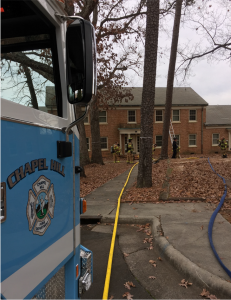
False fire alarms aren’t just a nuisance in your workday, they can also be detrimental to human behavior and costly to the university. Did you know that, last fiscal year the Chapel Hill Fire Department responded to 240 calls that they deemed false, costing the university just under $15,000 in fines. The fire alarm in your building will sound for one of three reasons:
- Required- the NC fire code requires fire alarm systems to be tested annually and for the occupants to participate in a drill. This activation is planned by EHS-Fire Safety and the building is notified ahead of time.
- Warning- unchecked products of combustion have activated a detector. All occupants need to leave the building for their safety and the fire department will arrive.
- Unwanted- a malfunction in the system, malicious intent, or smoke, heat, or steam from a nonthreatening source has activated a detector.
Each time the alarm sounds, occupants need to leave the building and should never assume that the activation is an unwanted alarm. However, there are steps that can reduce false alarms, keep the work day flowing, and help the University be good partners to the Chapel Hill Fire Department.

- Take care while moving carts, equipment, or furniture about a building. Knocking into a red fire alarm pull station can activate the alarm.
- Use caution while cooking and microwaving food that smoke does not enter the alarm.
- Only use cooking appliances in designated kitchens or breakrooms. Often, these spaces are equipped with fire alarm devices designed specifically for cooking areas.
- Place a work order to Facilities if any part of a fire alarm system needs repair or maintenance.
- Avoid dust or mist that could mimic smoke. Items like aerosolizing air fresheners, hairsprays, cleaning products, smoking, or stirring up accumulated dust can activate the alarm.
- Follow campus rules for not smoking in or around buildings.
If you believe that your actions may have activated the fire alarm, please make contact with fire personnel or Public Safety as they arrive on scene. Finally, supervisors should set the example and always lead employees out of the building during a fire alarm, no matter the reason for activation. Every second counts in the event of a fire, and time wasted inside the building could be the difference between your health and safety.
For additional information, Emily Powell can be reached at enpowell@ehs.unc.edu or 919-962-3830.
